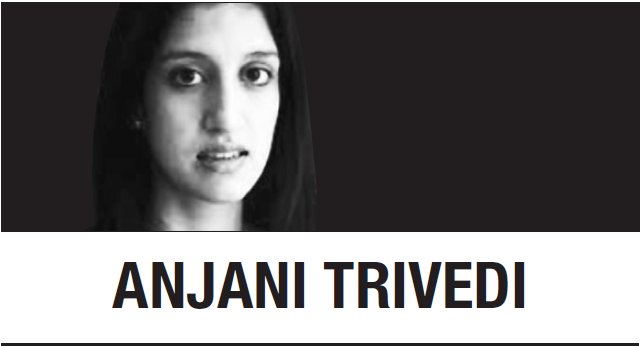[Anjani Trivedi] Japan’s legendary trading houses have a new story
By Korea HeraldPublished : Oct. 3, 2018 - 17:24
 Japan’s storied trading houses are emerging from the shadow of billions of dollars of impairments they took after the financial crisis and the end of the commodity super-cycle.
Japan’s storied trading houses are emerging from the shadow of billions of dollars of impairments they took after the financial crisis and the end of the commodity super-cycle.Stocks of the so-called sogo shosha, the groups that drove Japan’s postwar export success -- the likes of Itochu Corp., Marubeni Corp. and Mitsubishi Corp. -- have rallied as much as 36 percent over the last year, outpacing the race to a three-decade high by the broad Topix Index. The trading companies’ free cash-flow levels are above those reached in their heyday, and their leverage much lower.
Ask investors why the shares are rallying and they’ll probably cite commodity prices, as they always have. The trading houses used to get almost 50 percent of their income from metals and energy assets, and started aggressively increasing their investments just as the cycle was peaking.
Then that cycle turned. The sogo shosha took a severe beating and prospects for a recovery seemed dim. As recently as March 2016, the top five (including Mitsui & Co. and Sumitomo Corp.) posted commodity-related impairments of almost 950 billion yen ($8.4 billion) over two quarters, much more than analysts had expected at the time. As they dealt with soaring debt-to-Ebitda, investors dumped the shares.
That led to a new chapter. The companies started recalibrating away from commodities and now own smaller chunks of mining and energy assets. Itochu, for example, expanded its machinery, financial-services and food-related segments. At Mitsubishi, consumer goods account for more than 50 percent of gross profit, and the company has been on an acquisition spree: In August, it announced plans to buy an 80 percent stake in a nationwide precooked rice and lunch-box business. Later in the month, it disclosed a partnership with Fast Retailing to launch the Uniqlo clothing chain in Vietnam next year.
The companies typically have taken a proprietary approach rather than a brokerage role. At times they’ve been regarded almost as banks or private-equity firms, or as commodities traders that also have big stakes in resources.
Through hundreds of subsidiaries, the sogo shosha got into every stage of the supply chain, procuring commodities, selling them and investing in businesses like food and textiles in Japan and worldwide.
Investors still see the trading houses as mainly a commodities play, however. Goldman Sachs, reinitiating coverage of the sector after a year, said in a report last week that the shares are highly correlated with resource prices, and cited the Bloomberg Commodity Index. That index measures a host of tradable assets, with an almost 11 percent weighting for gold and 4.35 percent in live cattle futures -- but it doesn’t include coking coal and iron ore, mainstays of the trading firms, and obviously can’t represent their retail businesses.
As Jefferies analyst Thanh Ha Pham points out, the trading houses’ spread of interests makes it hard to pin down a single growth driver.
So the big five and their brethren have been valued based variously on their books, or as holding companies, or as asset managers with a discount to asset values, or just on earnings.
But there’s a disconnect: Investors have acknowledged that the sogo shosha cleaned up their accounts, so they’re trading between 8 percent to 50 percent above their five-year average price to tangible book value per share. On a price-earnings basis, however, the shares stand at a discount of 4 percent to 35 percent of their long-term averages, despite record profits. They’re also trading almost 40 percent below the rest of the Topix 500, while their returns on equity are 30 percent above peers.
Sure, trading companies’ earnings are often volatile and riddled with one-time items, so the P/E gauge may not be perfect. And perhaps the companies are still burdened by the histories of their investment decisions. But their businesses have changed and the impact on value is being ignored. What’s more, a major Japanese tax overhaul kicked in during the year investors were looking elsewhere, which might encourage restructuring and perhaps narrow the conglomerate discount.
As the Japanese market bounces back, it’s time to take a look at the new stories being told by the nation’s most famous names.
Anjani Trivedi
Anjani Trivedi is a Bloomberg Opinion columnist covering industrial companies in Asia. -- Ed.
-
Articles by Korea Herald









![[Kim Seong-kon] Democracy and the future of South Korea](http://res.heraldm.com/phpwas/restmb_idxmake.php?idx=644&simg=/content/image/2024/04/16/20240416050802_0.jpg&u=)








![[KH Explains] Hyundai's full hybrid edge to pay off amid slow transition to pure EVs](http://res.heraldm.com/phpwas/restmb_idxmake.php?idx=652&simg=/content/image/2024/04/18/20240418050645_0.jpg&u=20240418181020)

![[Today’s K-pop] Zico drops snippet of collaboration with Jennie](http://res.heraldm.com/phpwas/restmb_idxmake.php?idx=642&simg=/content/image/2024/04/18/20240418050702_0.jpg&u=)